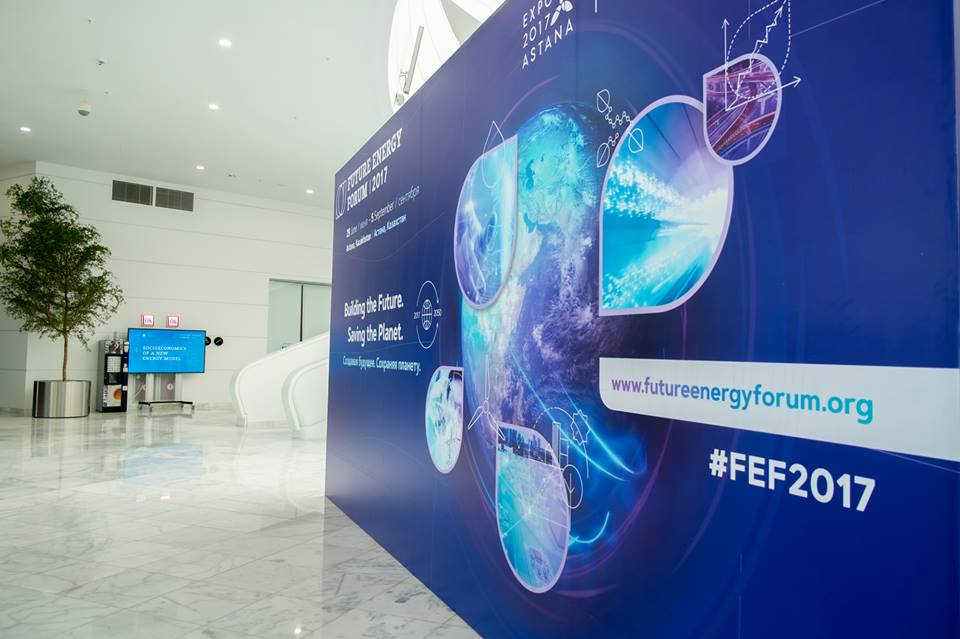ASTANA – The European Investment Bank (EIB) provided more than 500 million euros in loans to Kazakhstan for its renewable and clean energy initiatives over the last five years, EIB Secretary General Klaus Trömel reported July 24 as he addressed participants of the Future Energy Forum in Astana.
With 25 percent of the lending portfolio allocated to climate and energy projects worldwide, it makes the bank the world’s largest multilateral lender in these sectors.
“In Kazakhstan, with our counterparts, we finance a lot on climate and energy. As part of the overall support to the EU Partnership and across the Eastern Partnership countries, here we are trying to support these activities. I am very glad to report that this excellent cooperation with our host Kazakhstan has allowed us to sign over half a billion of loans and all of those in the area of climate action and environment,” noted Trömel.
The recent 100-million-euro-loan agreement with Kazakhstan signed last week shows EIB readiness for additional cooperation.
Sustainable energy solutions once again top the agenda of the Future Energy Forum, a series of 12 two-day conferences June 29 until Sept. 5 in Astana and bringing leading experts in clean energy from academia, technology, business and finance together to exchange ideas and innovations, promote dialogue and boost investment.
This time, the event focused on sustainable energy solutions for cities and buildings that by far are among the largest energy consumers in the EU.
Opening the forum, head of the EU Delegation to Kazakhstan Ambassador Traian Hristea marked the importance of Astana as the host of the event.
“What could be better venue for Energy Days than Astana? Thanks to the persistence and kind hosting of Kazakhstan, this event makes a significant contribution to the future energy theme. Today’s event is about the synthesis of EXPO 2017 and future energy. There could not be more successful example of sustainable future solutions,” noted Hristea in his opening remarks.
According to him, the forum embodies an important step in strategic cooperation between the EU and Kazakhstan. “This is the format that we use each and every time to prove the EU commitment in pushing forward a strong partnership agenda for cooperation in energy field between the EU and Kazakhstan. This shows that the EU does not only commit but also delivers upon its strategic agenda with Kazakhstan,” added Hristea.
Deputy Director-General for Energy at the European Commission Gerasimos Thomas also pointed out an essential role of Kazakhstan as a strategic partner.
“Kazakhstan is a privileged partner for the EU. It is a major energy supplier for us. It is a contributor to our efforts to diversify our energy sources. Six percent of our oil needs come from Kazakhstan, more than 21 of our uranium needs for the countries that use nuclear power come from Kazakhstan,” added Thomas.
According to him, the forum’s theme is particularly important for the EU now trying to turn “unresponsive and passive” buildings to “highly efficient micro energy hubs,” where buildings consume 40 percent of all energy and produce over 30 percent of all CO2 emissions. In addition, 75 percent of all buildings in the EU countries are energy inefficient.
Thus, leading EU experts in clean energy are working to achieve results in clean energy transition, which offers ways to save energy, including insulating walls, installing solar panels, using environmentally friendly technologies in construction and promoting smart technologies that help reduce energy consumption.
Kazakhstan’s Deputy Energy Minister Gani Sadybekov also reiterated the importance of the forum’s theme at international and local level.
International agreements, including the 2030 United Nations Agenda for Sustainable Development and the Paris Climate Agreement affirm to international recognition that larger efforts are required to contend the adverse consequences that may follow, he said.
According to Sadybekov, energy efficiency and transitioning to green energy are equally essential topics for Kazakhstan.
“Kazakhstan is now implementing several initiatives within its Green Economy Concept. Among its six directions is energy efficiency,” he noted.
“In this regard, Kazakhstan should not miss the opportunity for further comprehensive growth because this is what will help it be ready for global challenges and will ensure the use of full potential of renewable energy sources,” added Sadybekov.

